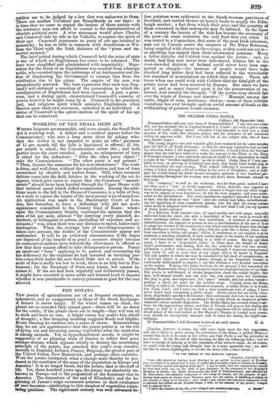THE POTATO.
THE panics of agriculturists are of as frequent recurrence, as ephemeral, and as exaggerated, as those of the Stock Exchange. A farmer is never happy. If the wheat comes up thick, the plants are so crowded they cannot grow—there will be no straw for the cattle ; if the plants shoot out in length—they will run all to stalk and have no ears. A bright sunny day makes him afraid of drought; a fine dropping morning suggests floods and blights. Every blessing he tortures into a cause of alarm. Remembering this, we are not apprehensive that the genus potato is on the eve of dying out and becoming among vegetables what the mastodon is among- animals. Yet, in hypochondriacal moods, it might be suggestive of no pleasing train of fancies to reflect that some strange disease, which appears utterly to destroy the nourishing principle of the potato, has attacked this year's crop simulta- neously. in England, Ireland, France, Belgium, the greater part of the United States, New Brunswick, and perhaps other countries. Were the potato extirpated, what a change must thereby be pro- duced in the condition of the mass of the population in Europe and America! It is no longer bread, but the potato, that is the staff of life. Yet, three hundred years ago, the potato was absolutely un- known in Europe and to the progenitors of the dominant race in America. The dramatists of the end of Elizabeth's and the be- ginning of James's reign enumerate potatoes in their.catalogues of rare luxuries--attributing to this simplest of vegetables stimu- lating qualities. The eighteenth century was well advanced be- fore potatoes were cultivated in the South-western „provinces of Scotland, and carried thence on horse's backs to supply the Edin- burgh market; a fact from which their price and the quantity Of them consumed in that metropolis may be inferred. In the lapse of a century the luxury of the rich has become the necessary of the poor—in some countries the only food.they can relish. It was stated to a Committee, that some of the poor Irish labourers, sent out to Canada under the auspices of Mr. Peter Robinson, being supplied with cheese on the voyage, at first could not eat it— or anything less insipid than their accustomed potatoes. Many a bitter diatribe did Cobbett vent against the potato : and, no doubt, 'had that root never been introduced, human life in the over-crowded districts of Ireland could never have been sup- ported so cheaply—the increase of people would have been checked long before they had been reduced to the •wretchedly low standard of nourishment on which they subsist. There ale times when one could wish with Cobbett that the fatalgift of the potato never had been received by Europe. But since we have got it, and so many depend upon it for the preservation of ex- istence, how terrible the thought, " If the potato-crop should fail over the whole of Europe and America! " Murrain among the cattle, blight of corn, pestilence, cholera—none of these terrible visitations has ever brought such an awful amount of death as the withholding of potatoes would occasion.


























 Previous page
Previous page